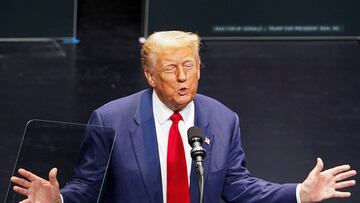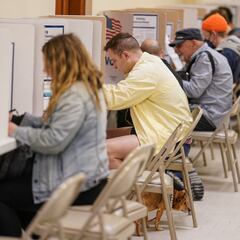Donald Trump’s bold plan to steal factories and jobs from other countries slammed by experts
The Republican presidential candidate is doing and saying what he can as he attempts to return to the White House.


Former President Donald Trump is doubling down on his plan to lure manufacturing jobs away from foreign nations, including key allies of the United States. The bold pitch, made with all his usual style, came during a rally in Savannah, Georgia, and revolves around a “manufacturing renaissance” that Trump promises will kickstart a new era of American industry, if he wins the November 5 election.
His approach is to offer foreign companies lower taxes and fewer regulations to entice them to pack up their factories and plant roots on American soil. With a straight face and a wink to his supporters, Trump declarations.
“We will take other countries’ jobs. We’re going to take their factories.” The proposal, which hinges on offering irresistible incentives to foreign manufacturers, has left many scratching their heads – and some, particularly economists, ringing alarm bells.
Can Trump really “steal” jobs from allies like South Korea and Germany?
While Trump’s rhetoric often borders on the theatrical, and there is obviously no fact checker interrupting him at these events, his promise to orchestrate a mass exodus of manufacturing from places like South Korea, Germany, and even China is gaining traction among certain voting blocks. The question is, at what cost?
Trump insists that the migration of factories back to the US will be fueled by a combination of rock-bottom taxes and an environment blissfully free of regulatory red tape. If you’re a foreign company willing to move your operations stateside, Trump has a deal for you: low taxes and high fives.
Trump is not messing around. He just called out John Deere to their face for replacing American jobs with foreign labor.
— 🇺🇸Travis🇺🇸 (@Travis_4_Trump) September 23, 2024
“I just noticed behind me, John Deere tractors. As you know, they’ve announced they’re going to move a lot of their manufacturing business to Mexico. I’m just… pic.twitter.com/zzo1fzODmb
And for those who refuse the offer, Trump vowed to slap hefty tariffs on companies that prefer to keep their production abroad but still want to sell to American consumers. He took aim specifically, and repeatedly, at John Deere, threatening a jaw-dropping 200% tariff on imports if the company dared to shift operations to Mexico.
What do economists say about Trump’s plan?
Not surprisingly, Trump’s grandiose scheme to “take” factories from other countries hasn’t gone over smoothly with experts. Many economists are pointing out that such aggressive trade barriers could not only lead to diplomatic headaches but also fuel inflation at home. “You can’t just slap a 200% tariff on everything and expect no consequences,” one expert said. Higher prices for imported goods would hit consumers right where it hurts – in their wallets – adding to already mounting concerns about inflation.
The plan to lower corporate taxes for US-based manufacturers and offer first-year write-offs for heavy machinery has its own set of issues. Economists argue that these cuts, coupled with expansive tariffs, would ultimately drain government revenues and bloat the federal deficit – a tab that future generations would likely be stuck paying.
Trump also proposed the creation of a new role: a global manufacturing ambassador. The job description is simple: convince foreign companies to move their factories to America, or else. He’s even suggested setting up special low-tax zones on federal land to sweeten the deal. However, as with most of Trump’s proposals, or possibly concepts, the specifics are a bit fuzzy. How exactly would these foreign companies operate on federal land? Would they get a free pass on property taxes too? These are questions yet to be answered, and for now, Trump seems to prefer focusing on the broad strokes.
.@LeaderMcConnell on former President Trump's tariff proposals: I'm not a fan of tariffs. They raise the prices for American consumers. I'm more of a free trade kind of Republican that remembers how many jobs were created by the export that we engage in. So, I'm not a tariff fan. pic.twitter.com/50haKrEk3Z
— CSPAN (@cspan) September 24, 2024
Can Harris counter Trump’s economic pitch?
Despite the fanfare surrounding Trump’s economic vision, his Democratic rival, Vice President Kamala Harris, is no stranger to the economic battlefield. A recent Reuters/Ipsos poll revealed a near tie between the two candidates on who voters trust more to manage the economy – 43% backing Trump, 41% for Harris. Trump’s once-formidable lead on the economy has shrunk, thanks in part to Harris’s efforts to narrow the gap by addressing the high cost of living, a top concern for voters.
Related stories
Harris is set to deliver a major economic speech in Pennsylvania, and much like Trump, she’s hoping to win over voters in key battleground states. While Trump’s vision centres around revitalising American manufacturing by “stealing” factories from other countries, Harris is expected to focus on policies that will help Americans build and maintain wealth.
While Trump’s plan may resonate with voters hungry for a return to American-made products, the viability of his “manufacturing renaissance” remains in question. His push for aggressive tariffs, paired with promises of low-tax manufacturing zones, might sound appealing on the surface, but economists are less enthusiastic. And though Trump’s tough talk about stealing jobs from US allies makes for great campaign soundbites, the complexities of global trade – and the potential fallout – suggest that these promises might be more fiction than fact. But the message delivered is often all he needs.


Complete your personal details to comment